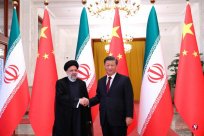China's permanent representative of the United Nations Zhang Jun on Tuesday (February 14) said at the United Nations Security Council that the international community should strengthen forward -looking research on the consequences of the rise of sea level, and at the same time aim at the root cause of climate change, delay delaying all efforts to delay the full effortClimate warming, curbing the rapid rise of sea planes.Zhang Jun also pointed out that Japan's pollution water to the ocean will seriously endanger the health of the global marine environment, ecosystems, and the lives of the peoples of various countries.This problem is by no means a private affairs of Japan.
根据中国常驻联合国网站发布的新闻稿,张军在会上发言说,海平面上升推高了全球生态系统以及人类社会的脆弱性,可能引发领土淹没、人口迁移、A series of issues such as property losses have brought comprehensive challenges to human survival and development. For small islands developing countries and low -lying coastline countries, it is even more related to life and death.China is also a country with a long coastline, and China is also paying attention to the risks brought by the rising sea level.The rise of the sea level also puts forward new topics for marine law, state status, and personnel protection. The relationship with security issues is very complicated. These need to be conducted in -depth comprehensive research.China is looking forward to the research on the "Sea Planes related to international law" by the International Law Commission on the conduct of pragmatic, objective, and valuable results.
Zhang Jun emphasized that the rising sea level is caused by multiple factors such as global warming and polar glacier melting, which is a key indicator of climate change.The international community should strengthen the forward -looking research on the consequences of the rise of sea level, and at the same time aim at the root cause of climate change, to delay the warming of climate and curb the rapid rise of sea level.UN Secretary -General Gutres issued a warning many times that the earth is rapidly approaching the critical point of climate change.The international community should enhance the urgency of urgency and take all necessary actions to prevent climate change from causing irreversible disasters to humans.
Zhang Jun also said that slowing climate change is related to the fate of all human beings. The determination of the international community cannot be shaken, and the action cannot be relaxed.To achieve the temperature control target determined by the Paris Agreement, developed countries must increase the first reduction of emissions.However, since last year, energy policies in developed countries have been backward, and fossil energy consumption and carbon emissions have continued to increase, which has made the already fragile global emission reduction prospects at danger.Developed countries generally propose the "dual carbon" goals and plans earlier, and should play an example and take practical action to implement it.
Funding is always the core and key issues of global climate governance.Developed countries have the responsibility and obligations to provide climate change financing and assistance to developing countries.In 2009, developed countries promised to provide funds of $ 100 billion (about Singaporeid) to developing countries each year, but they have never really been in place so far. The so -called promise has become a short check.What's more, while some countries have negatively treated the capital needs of developing countries, while promoting their energy transformation, they have invested hundreds of billions of dollars to provide high subsidies for the country's manufacturing industry through the so -called "inflation reduction bill".This hypocritical and selfish "green protectionism" violates the rules of the WTO, forms discrimination against related industries in other countries, and has a collective effort to damage global response to climate change.
Zhang Jun appealed to adhere to the true multilateralism and strengthening the union is the only way out to respond to the challenge of climate change.We must continue to adhere to the principles of common but different responsibilities, which is related to international fairness and justice.Departure this principle will seriously damage the unity and cooperation of the international community to deal with climate change.The United Nations Climate Change Framework Convention and its Paris Agreement are the main framework for international cooperation in climate change. It is not easy to achieve results, and all parties need to cherish and maintain them together.The Security Council can study targeted response methods based on the specific situation of specific countries and based on the mechanism of accurately grasping climate -driven safety risks.
To respond to climate change and the rise of sea level, we must always focus on implementing the 2023 agenda and create favorable conditions for achieving sustainable development goals.In the development of small islands, countries are the most vulnerable to climate, and their adaptability is also the most vulnerable.The international community should effectively solve the concerns and demands of countries in the development of small islands, help them strengthen their capacity building through funding and technical assistance, enhance climate toughness, and achieve green and low -carbon development.The ocean is the basis for survival and development of countries around the world. Protecting the marine environment is the common responsibility of all mankind.Right now, an imminent challenge is the issue of the 400,000 -ton nuclear pollution water in the Fukushima nuclear power plant. This will seriously damage the marine environment and harm the health of the people.China urges Japan to fulfill its due international obligations, deal with nuclear pollution water in a scientific, open, transparent, and safe manner, and effectively protect the marine ecological environment.
After the Japanese representative spoke, Zhang Jun also said that the theme of this meeting was the impact of sea level rising.It is conceivable that if the seawater that is seriously polluting is rising, the consequences will be huge and the harm will be more far -reaching.This is an important reason why China mentioned this issue and expressed concerns.Japan has confirmed that in the first quarter of this year, at least 400,000 tons of nuclear pollution water will be discharged to the Pacific Ocean.Fukushima nuclear pollution water contains more than 60 radioactive substances, and it is expected to discharge for 30 years.Japan's polluting water to the ocean will seriously endanger the health of the global marine environment, ecosystems and the people of all countries.Therefore, this problem is by no means a private affairs of Japan.The stakeholders such as neighboring countries and Pacific island nations in Japan have expressed serious concerns about the mistakes of the Japanese side's mistakes, and there are strong opposition to Japan.
Zhang Jun also pointed out that the Japanese side has not yet made science and such key issues such as the legitimacy of the sea programs, the reliability of the nuclear pollution water data, the effectiveness of the purification device, and the uncertainty of the environmental impact.The credible explanation has not made full and meaningful negotiations including the stakeholders including neighboring countries.Regarding international organizations have not yet completed the assessment of the Japanese disposal plan, and no specific conclusions have been concluded.In this case, the Japanese side was intended to do it alone, forcibly approved the nuclear pollution water discharge plan, and accelerated the preparations for the preparation of the sea.This behavior is extremely irresponsible.
Zhang Jun also said that he had to doubt to the Japanese side that the nuclear pollution water was safe and harmless after treatment.If the Japanese side really thinks so, there can be other emission solutions, including discharged into the lakes and rivers in Japan.China urges the Japanese side to face the legitimate concern of all parties. Before reaching an agreement with the stakeholders of the neighboring countries and the negotiation of relevant international organizations, it should not start the nuclear pollution water programs without authorization.Pay close attention.



